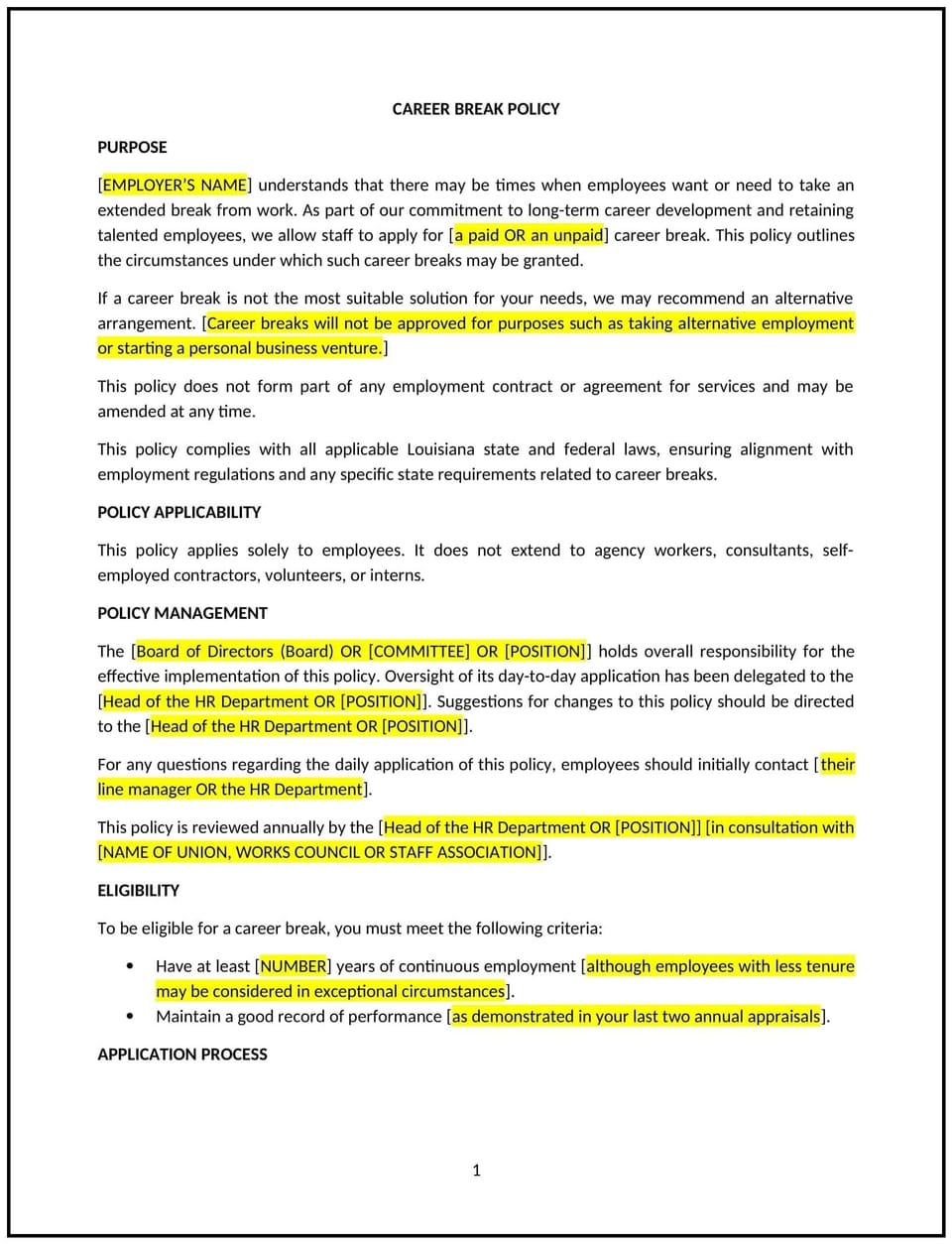Career break policy (Louisiana): Free template

Career break policy (Louisiana)
This career break policy is designed to help Louisiana businesses provide a structured framework for employees seeking extended time away from work for personal, educational, or professional development reasons. It outlines eligibility, procedures, and guidelines to manage career breaks effectively while supporting both employees and organizational needs.
By implementing this policy, businesses can promote employee well-being, enhance retention, and foster a culture of flexibility.
How to use this career break policy (Louisiana)
- Define eligibility: Specify which employees are eligible to request a career break, such as those with a minimum tenure or in specific roles.
- Outline permissible reasons: Identify acceptable purposes for career breaks, such as education, caregiving, or personal development.
- Establish request procedures: Detail how employees should formally request a career break, including required notice and documentation.
- Clarify duration limits: Set guidelines for the minimum and maximum length of career breaks.
- Address return-to-work expectations: Define how employees can return to their role or a similar position following the career break.
- Include contract terms: Specify how employment terms, such as benefits and seniority, are affected during a career break.
Benefits of using a career break policy (Louisiana)
Implementing this policy provides several advantages for Louisiana businesses:
- Enhances retention: Encourages employees to remain with the organization by offering flexibility during critical life stages.
- Promotes workforce planning: Provides a structured process for managing long-term absences.
- Supports employee well-being: Allows employees to pursue personal or professional goals without sacrificing their career.
- Aligns with organizational goals: Ensures career breaks are managed to minimize disruption and maintain productivity.
- Encourages loyalty: Demonstrates commitment to supporting employees’ long-term growth and needs.
Tips for using this career break policy (Louisiana)
- Plan ahead: Encourage employees to submit career break requests well in advance to allow for workforce adjustments.
- Maintain clear communication: Keep an open dialogue with employees about their intentions and plans for returning to work.
- Review roles and responsibilities: Assess how the employee’s duties will be managed during their absence to ensure business continuity.
- Offer support for reintegration: Provide guidance and training to help employees transition back into their roles after a career break.
- Update the policy regularly: Reflect changes in organizational needs or Louisiana-specific considerations to keep the policy relevant.
Q: What reasons are typically approved for a career break?
A: Career breaks may be approved for reasons such as education, caregiving, personal development, or other significant life events that align with company policy.
Q: How should businesses handle employee benefits during a career break?
A: Businesses should clearly define how benefits like health insurance, retirement contributions, or paid time off are impacted during the career break.
Q: Can businesses deny a career break request?
A: Yes, businesses may deny requests if operational needs cannot accommodate the absence or if the request does not meet policy requirements.
Q: How can businesses prepare for an employee’s career break?
A: Businesses can plan for temporary role coverage, redistribute tasks among team members, or hire a temporary replacement if needed.
Q: What steps should businesses take when an employee returns from a career break?
A: Businesses should offer a reintegration plan, such as training or mentorship, to help the returning employee adjust to changes in the workplace.
Q: How often should this policy be reviewed?
A: The policy should be reviewed annually or when organizational priorities or Louisiana workplace regulations change.
Q: Are career breaks paid or unpaid?
A: Career breaks are typically unpaid, but businesses can clarify any exceptions or alternative arrangements in their policy.
This article contains general legal information and does not contain legal advice. Cobrief is not a law firm or a substitute for an attorney or law firm. The law is complex and changes often. For legal advice, please ask a lawyer.


